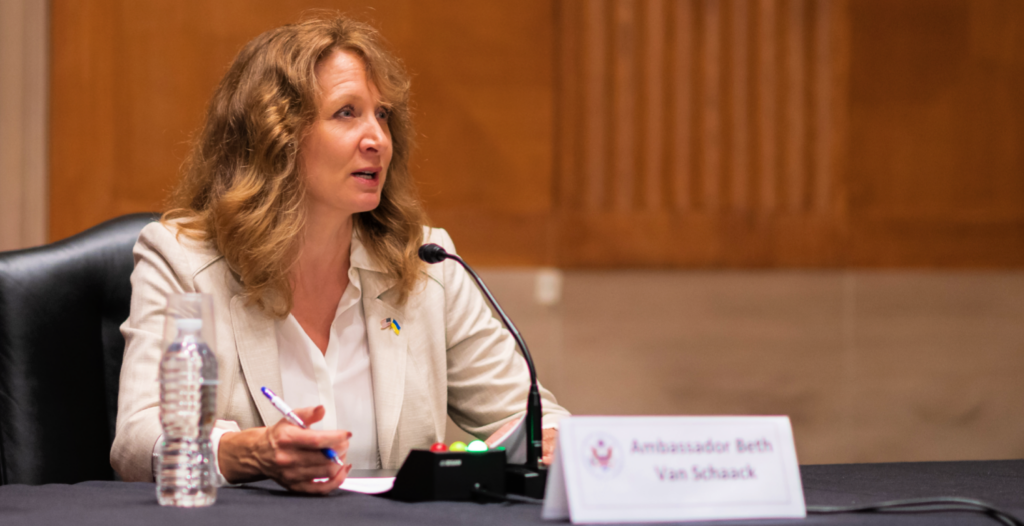Mr. Speaker, H. Res. 578 expresses deep disappointment that the Romanian government has instituted a virtual ban on intercountry adoptions with serious implications for the well-being of orphaned and abandoned children in Romania.
Immediately after the December 1989 revolution, Mr. Speaker, which ousted the much-hated dictator Nicholae Ceausescu, the world learned that tens of thousands of underfed, neglected children were living in institutions, called orphanages, throughout Romania. A month after the fall of Ceausescu, Dorothy Taft, who is our deputy chief of staff at the Commission on Security and Cooperation in Europe, and I traveled to Bucharest and visited those orphanages. We also met with government officials and spoke about the hope for democracy in that country. But one of the most lasting impressions that I have from that trip is being in an orphanage in Bucharest, where dozens of children were lined up with no one to turn them, to change their diapers and, in some cases, even to feed them with the frequency that their little bodies required. It left a lasting impression upon me.
Sadly, all these years later, Mr. Speaker, Romania’s child abandonment rate that we witnessed firsthand on that trip has not changed significantly over those years. As of December 2005, 76,509 children are currently in the child protection system.
While the Romanian government deserves at least some credit for reducing the number of children living in institutions from 100,000 to 28,000, this is only part of the picture. The government statistics do not include the abandoned infants living for years in maternity and pediatric hospitals, where donations from charities and individuals keep the children alive; and more than 40,000 of the children moved out of the institutions are living in nonpermanent settings or foster care, or with maternal assistance, paid by the government or with a distant relative who do not intend to adopt them, but do accept them for a stipend.
In the context of Romania’s ascension to the European Union, unsubstantiated allegations have been made about the qualifications and motives for those who adopt internationally and the fate of those adopted children.
Intercountry adoption, Mr. Speaker, was falsely equated with child trafficking, and Romania faced relentless pressure to prohibit intercountry adoptions. Sadly, rather than focusing on the best interest of the children, Romanian policymakers acquiesced to the European Union’s pressure, especially its rapporteur, Lady Emma Nicholson, by enacting a law in 2004 that banned intercountry adoption, except by biological grandparents. By foreclosing foreign adoptions, the laws codified the misguided proposition that a foster family, or even an institution, is preferable to an adoptive family outside of the child’s country of birth.
Between 1990 and 2004, I would note, more than 8,000 Romanian children found permanent families in the United States and thousands more joined families in Western Europe and elsewhere. This possibility is now gone. Some Romanians and Europeans argue that this law, this misguided law, is somehow consistent with Hague Convention on the Intercountry Adoptions and the Rights of the Child Convention. They also allege that “there is little scope, if any, for international adoptions in Romania because there are so few children who are legally adoptable.”
Mr. Speaker, the low numbers declared “legally adoptable” is not something to be proud of. It is a contrivance. Indeed, it is a denunciation of the child welfare system, which now places such an unrealistic priority on unification with blood relatives that it is nearly impossible to determine any child is adoptable, no matter how old and how long they have been in state care without contact with the blood relatives.
If more children were made available for adoption, there would be a great need for intercountry adoption. Barely a thousand children have ever been domestically adopted in Romania in any given year. As a result of the new laws, only 333 children were entrusted for domestic adoption last year.
For thousands of children abandoned annually in Romania, domestic or intercountry adoption offered the hope of a life outside of foster care or an institution. That hope has now been dashed and destroyed.
Last September, Mr. Speaker, I chaired a hearing of the Commission on Security and Cooperation in Europe at which Maura Harty, the Deputy Under Secretary of State, rebutted the argument that the adoption ban is somehow consistent with Romania’s intercountry international treaty obligations. Likewise, our witnesses, including Dr. Dana Johnson, Director of the International Adoption Clinic and Neonatology Division at the University of Minnesota’s Children’s Hospital, testified that Romania’s concentration on reunification of an abandoned child with his or her biological family is only superficially consistent with the U.N. Convention on the Rights of the Child.
He also talked about the deleterious effect of such waiting, being held in foster care and especially in institutions, has on a child’s mental, as well as their physical health.
When Romania enacted its intercountry adoption ban, there were 211 pending cases in which children have been matched with adoptive parents in the United States. Approximately a thousand more have been matched with parents in Western Europe, Israel and Australia. In the past few weeks there have been unofficial reports that pending applications are being rejected across the board and the dossiers returned to the adoptive parents.
A document from the Romanian Office for Adoption acknowledged that fewer than 300 of these children have been placed in permanent situations, either returned to biological parents or adopted within Romania. The vast majority remain in limbo. This cannot be the last word of what we often call “the pipeline cases.”
The Romanian government repeatedly promised to analyze each pending case thoroughly, but the review that has supposedly been done was not transparent, was not done on a case-by-case basis, and was not conducted according to clear and valid criteria that is in the best interest of each individual child. These cases involve prospective families who have proven their good faith, by waiting for years for these children. Many cases involve children who will not be domestically adopted due to their special needs, medical or societal prejudices.
In at least three cases, Mr. Speaker, children are already living in the United States with their prospective adoptive parents while receiving life-saving medical treatment, including a child with spina bifida. These children were legally adoptable until Romania’s new law took effect.
Let me say that when I introduced this resolution in November, I asked the question, who in the European Union will stand with Members of our Congress, to protect these defenseless children?
Today I am happy to say, members of the European Parliament are challenging the anti-adoption monopoly over this issue and that is encouraging. On December 15, the European Parliament urged Romania to act in the pending cases with the goal of allowing intercountry adoptions to take place where justified and appropriate. In March, the European Parliament’s rapporteur for Romania’s EU accession, Mr. Pierre Moscovici, reported that he notably differs on the issue of international adoption of Romanian children from the previous rapporteur, Baroness Emma Nicholson, whose virulent anti-adoption views that hurt the children of Romania are now very, very well known.
I applaud the European Parliament and I am glad that our parliament, this Congress, is poised to go on record very strongly in trying to resolve these pipeline cases.
In closing, I want again to thank Chairman Hyde and Ranking Member Lantos for their tremendous support for this resolution and the underlying issue of trying to encourage intercountry adoption in a country, Romania that has now, in a misguided fashion, turned their back on those children who could find loving, durable homes with the adoption option.
Let me also thank so many other people who were a part of this, but especially Maureen Walsh, who is our General Counsel for the Commission on Security and Cooperation in Europe, for her extraordinary expertise and work on the issue and this resolution. We have had an ongoing process, contacting the highest levels of the government of Romania, from the President on down. It has been ongoing. It has been frequent.
Our hearing that Ben Cardin and I put on last year I think brought all of these issues to the fore in a way that were very persuasive on the part of the pipeline families, as well as the issue itself. The intercountry adoption is a loving, compassionate option, and certainly is far better than languishing in an orphanage somewhere where the child is warehoused.
Mr. Speaker, so we call upon the Romanian government again to reverse its position, to cease its mucking under Lady Nicholson’s pressure, which is now going into reverse. The European Union, as I said before, is showing clear signs that it concludes it has made a profound mistake.
I want to thank Mr. Cardin, who is our ranking member on the Commission on Security and Cooperation in Europe, who has been working on these issues side by side.




